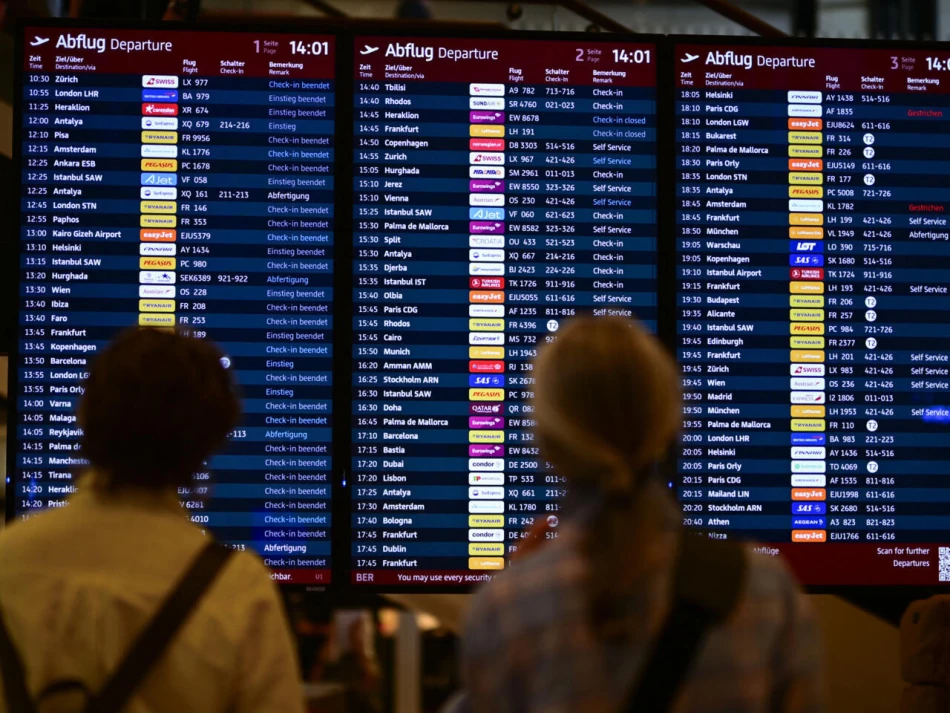
Cyber Attack Disrupts Air Traffic at European Airports
Major European Airports Paralyzed by Cyberattack on Critical Check-in Systems
A sophisticated cyberattack on Collins Aerospace's passenger check-in software has brought chaos to some of Europe's busiest airports, including Brussels, Berlin, and London Heathrow, forcing thousands of passengers into hours-long queues and triggering widespread flight cancellations. The attack highlights the aviation industry's dangerous reliance on centralized digital infrastructure and raises urgent questions about cybersecurity preparedness at critical transport hubs.
The Scale of Disruption
The cyberattack, which occurred overnight Friday, targeted Collins Aerospace's MUSE software system—a critical platform used for passenger check-in and baggage handling across multiple European airports. The impact was immediate and severe, forcing airport staff to revert to manual check-in procedures that haven't been the primary method in over a decade.
At Brussels Airport, the disruption was particularly acute. At least 10 flights were cancelled outright, while 17 others experienced delays exceeding one hour. The airport warned passengers to expect continued disruptions as staff worked to process travelers using paper-based systems.
London Heathrow faced even more dramatic consequences. Eurocontrol, the European air traffic management agency, ordered airlines to cancel half of all flights to and from the airport between 4 GMT Saturday and 2 GMT Sunday—an unprecedented measure that affects tens of thousands of travelers during peak weekend travel.
A Single Point of Failure Exposed
The incident starkly illustrates how modern aviation's efficiency gains have created dangerous vulnerabilities. Collins Aerospace, a subsidiary of defense giant Raytheon Technologies, provides critical infrastructure to airports worldwide. When their MUSE system failed, it created a domino effect across multiple countries simultaneously.
This centralization mirrors similar vulnerabilities seen in other critical infrastructure attacks. The 2021 Colonial Pipeline ransomware attack in the United States demonstrated how a single company's systems could paralyze an entire region's fuel supply. Saturday's airport chaos suggests the aviation sector faces similar systemic risks.
Manual Operations Reveal Hidden Dependencies
The forced return to manual check-in procedures has exposed how deeply airports depend on automated systems. Staff trained primarily on digital platforms struggled to maintain normal passenger flow rates, creating bottlenecks that rippled through entire terminal operations.
Cybersecurity in Aviation: A Growing Threat
Aviation has become an increasingly attractive target for cybercriminals and state-sponsored hackers. Unlike financial institutions, which have invested heavily in cybersecurity following decades of attacks, airports and aviation service providers have been slower to recognize their vulnerability.
The timing of this attack—during weekend leisure travel season—suggests either opportunistic criminals seeking maximum disruption or sophisticated actors testing response capabilities. Collins Aerospace has not disclosed the attack's origin or whether ransom demands were made, following standard incident response protocols.
Regulatory Gaps in Critical Infrastructure
European aviation cybersecurity regulations have lagged behind the sector's digital transformation. While the EU's NIS2 Directive aims to strengthen critical infrastructure protection, implementation remains inconsistent across member states. This attack may accelerate regulatory action, similar to how the 2017 WannaCry ransomware prompted healthcare cybersecurity reforms.
Market and Operational Implications
For investors, Saturday's disruption signals potential liability and reputation risks for companies providing critical aviation infrastructure. Collins Aerospace's parent company, Raytheon Technologies, may face scrutiny over its cybersecurity investments and incident response capabilities.
Airlines affected by the cancellations will likely seek compensation from Collins Aerospace under service level agreements, while passengers may pursue claims under EU261 regulations covering flight disruptions. The financial impact could reach tens of millions of euros when accounting for rebooking costs, passenger compensation, and lost revenue.
Competitive Advantages for Prepared Operators
Notably, Paris's Charles de Gaulle and Orly airports, operated by ADP Group, remained unaffected—likely due to different software providers or more robust backup systems. This operational resilience during competitors' struggles could strengthen ADP's position in future airport technology contracts.
Lessons for Global Aviation
This incident will likely accelerate industry discussions about system redundancy and vendor diversification. Airports may reconsider single-vendor strategies that, while cost-effective, create catastrophic failure points.
The attack also demonstrates the need for regular manual operation drills. Airports that maintained some manual check-in capabilities recovered faster than those completely dependent on digital systems.
As air travel continues recovering to pre-pandemic levels, Saturday's chaos serves as a stark reminder that the industry's digital transformation, while enabling unprecedented efficiency, has also created new vulnerabilities that require urgent attention from regulators, operators, and technology providers alike.
Most Viewed News

 Sara Khaled
Sara Khaled






